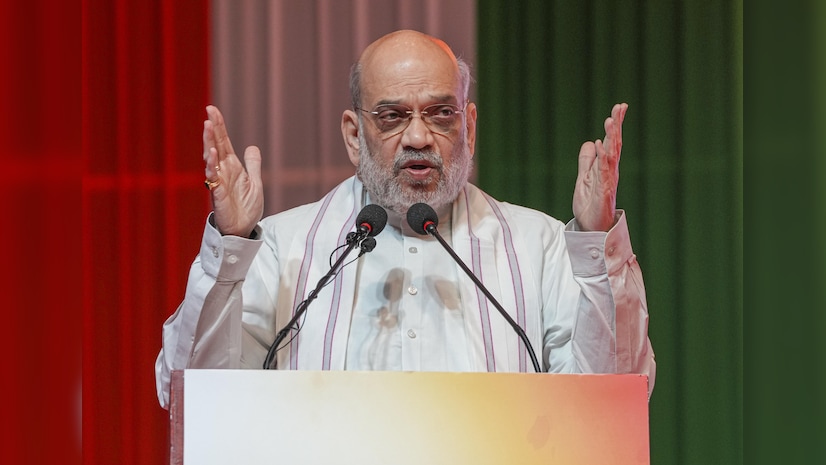
)
Union Home Minister Amit Shah (Photo: PTI)
The government has implemented several farmer-friendly policies in its first 100 days of the third term with focus on improving agricultural productivity and exports, Cooperation Minister Amit Shah said on Tuesday.
Addressing a press conference on the completion of 100 days of the Modi 3.0 regime, Shah said the government has implemented policies worth Rs 15 lakh crore across 14 sectors.
Listing works initiated for the welfare of the farmers, he also said the Modi government has launched the agriculture fund to support startups and rural enterprises, driving agricultural innovation.
The minister said the Agriculture Infrastructure Fund has been expanded to enhance agricultural infrastructure and support to farmers, and Rs 14,200 crore has been allocated across seven schemes to improve farmers’ lives and livelihoods.
The minister highlighted key achievements in the farm sector, including the disbursement of Rs 20,000 crore to 930 mn farmers under the Pradhan Mantri Kisan Samman Nidhi (PM-KISAN) scheme.
“Prime Minister Narendra Modi’s first decision of his third term was disbursement of Rs 20,000 crore to 930 mn farmers under the 17th instalment of PM Kisan Nidhi. So far, Rs 3 lakh crore has been disbursed to 123.3 mn farmers,” Shah said.
The PM-KISAN offers an annual benefit of Rs 6,000, distributed in three equal instalments of Rs 2,000 every four months, directly into the bank accounts of eligible farmers through the Direct Benefit Transfer (DBT) system.
The minister said that farm policies are being implemented keeping in mind the welfare and prosperity of the farming community.
“This will help boost the country’s foodgrains production and exports, thereby improving farmers’ plight,” he added.
Highlighting the government’s commitment to farmers, Shah said, “Compared to the UPA regime, the Modi government has procured more crops at MSP. This shows that the NDA government is committed towards the farmers”.
The MSP for Kharif crops has been increased for the 2024-25 season, ensuring that the farmers get fair prices for their produce. They will receive Rs 2 trillion through MSP, he added.
He also said the government will construct wheat silos with a combined capacity of 3.4 million tonnes (MT) across the country. This will reduce grain losses and extend shelf life.
The minister said special Di-Ammonium Phosphate (DAP) subsidy packages have been provided at Rs 3,500 per MT to P&K fertiliser companies to ensure affordable soil nutrient availability for farmers.
He said five integrated aquaparks will be set up in the country to strengthen the fisheries sector.
A total of 109 climate-resilient and biofortified high-yielding crops were dedicated to boosting productivity and bridging the gap between lab and land.
Under the ‘Mission Mausam’ with Rs 2,000 crore outlay, the government will help create a weather-ready and climate-smart Bharat, directly benefitting the agriculture sector.
He said under the Digital Agriculture Mission, farming will be modernised through digital technology.
To boost ethanol production, the minister said sugar mills are being converted into multi-feed distilleries.
“Now, mills can make ethanol not only from sugarcane juice but also from maize. Ethanol will be made from maize when sugarcane juice is required for making sugar in the country. Ethanol from sugar juice will be made when there is higher sugar production,” he explained.
Besides, he said, Rs 12,100 crore has been sanctioned by the government for Polavaram Irrigation Project to boost irrigation capacity.
Under the Clean Plant Programme with a budget of Rs 1,765 crore, the government will enhance fruit crop standards and establish nine state-of-the-art clean plant centres and 50 multi-product irradiation facilities for helping preservation of fruits and vegetables, he said.
In a move to support exports, the minister said the minimum export price (MEP) on onion and basmati rice has been scrapped.
These policies are part of the government’s broader strategy to enhance farmer welfare and boost India’s agricultural exports, Shah said.
Shah was flanked by Information and Broadcasting Minister Ashwini Vaishnaw at the press conference.
(Only the headline and picture of this report may have been reworked by the Business Standard staff; the rest of the content is auto-generated from a syndicated feed.)
First Published: Sep 17 2024 | 7:10 PM IST





